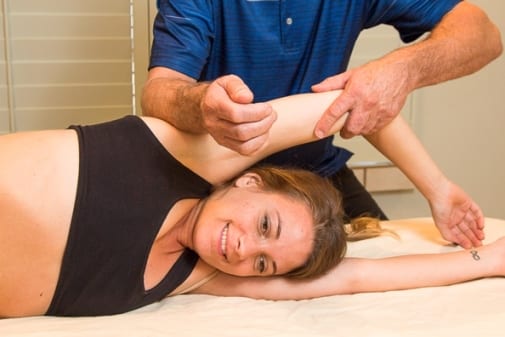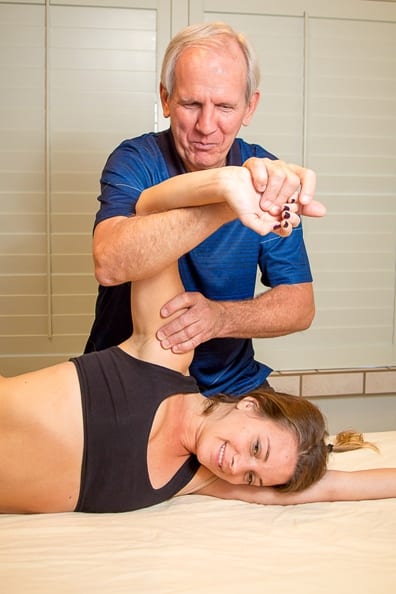Focus: Advanced Massage Techniques for a Complex Frozen Shoulder, Tennis and Golfers Elbow
 Master bodyworker Mark Senzig, BCTMB, MMT, CMT, presents a workshop on advanced Deep Tissue Techniques.
Master bodyworker Mark Senzig, BCTMB, MMT, CMT, presents a workshop on advanced Deep Tissue Techniques.
This workshop is for professional bodyworkers who want to improve their skills and build their practice.
Participants must be Certified Massage Therapists with current certification. Please note that having proper insurance is a MUST.
Workshop Details
Advanced Massage Workshops on the Go
Taught by Mark Senzig BCTMB, MMT, CMT
Santa Rosa, CA
Location TBA
Why Take this Workshop?
 Improve your hands-on techniques!
Improve your hands-on techniques!
With greater mastery comes better client results and reviews, as well as potential earnings.
We will cover advanced massage techniques for treating a complex frozen shoulder:
- Evaluate joint and soft tissue immobility with special attention to the biceps long head
- Assess upper trapezius, scalene, and sternocleidomastoid for trigger points
- Biceps Belly Technique
- Acromioclavicular joint technique
- Deep tissue trigger points: posterior and anterior of lateral upper extremity
- Assess scapula and glenohumeral junction trigger points
- Work in between the long head biceps and the short head biceps looking for bumps in the road
To enroll in this workshop, use the registration payment button on this page.
Tennis Elbow (Lateral Epicondylitis)
- Extensor Carpi Radialis Brevis
- Primary muscle involved in tennis elbow.
- Focus on reducing tension and trigger points.
- Extensor Carpi Radialis Longus
- Often involved in compensatory patterns.
- Massage to relieve tension and improve function.
- Extensor Digitorum
- Can contribute to lateral epicondylitis.
- Address muscle tightness and adhesions.
- Supinator
- Involved in forearm supination.
- Release tightness to improve forearm mobility.
Golfer’s Elbow (Medial Epicondylitis)
- Flexor Carpi Radialis
- Major muscle involved in golfer’s elbow.
- Target for deep tissue massage and trigger point release.
- Pronator Teres
- Contributes to medial elbow pain.
- Release trigger points and reduce tension.
- Flexor Carpi Ulnaris
- Can be involved in medial epicondylitis.
- Address muscle tightness and adhesions.
- Palmaris Longus
- Often involved in compensatory patterns.
- Focus on reducing tension and improving function.
Frozen Shoulder (Adhesive Capsulitis) / Shoulder Impingement
- Subscapularis
- Often has trigger points contributing to shoulder pain.
- Release to improve internal rotation and overall shoulder mobility.
- Infraspinatus
- Common site of trigger points and tension.
- Address to enhance external rotation and reduce impingement.
- Supraspinatus
- Involved in shoulder abduction.
- Release to alleviate impingement symptoms.
- Pectoralis Minor
- Can cause anterior shoulder tightness.
- Release to improve shoulder posture and reduce impingement.
- Levator Scapulae
- Often tight and contributes to shoulder sti^ness.
- Release to improve scapular mobility and reduce neck tension.
- Teres Minor
- Involved in external rotation.
- Address to improve shoulder mechanics.
- Biceps Brachii (long head)
- Can contribute to shoulder impingement.
- Release tension to improve shoulder function.
- Deltoid (particularly anterior and posterior fibers)
- Address to improve shoulder mobility and function.
Student Comments
“The Mastering Advanced Massage class was very informative. It focused on neck,TMJD and shoulder.
I myself have terrible shoulder pains. Mark used me as a model to demonstrate his technique on relieving shoulder pains. I had limited range of motion in my right shoulder. After he worked on my shoulder my range of motion improved dramatically.
—Howard D.
